Introduction
How Long Do Rabbits Sleep: In the tapestry of the natural world, each species weaves a distinct pattern of behavior that reflects its evolutionary history and ecological niche. Among these fascinating threads, the lives of rabbits stand out as a blend of vitality and serenity, captivating the interest of both scientists and enthusiasts alike. While rabbits are often celebrated for their boundless energy and endearing traits, such as their iconic hop and twitching noses, their sleep patterns remain a lesser-explored facet of their existence.
Curiosity beckons us to uncover the mystery: How long do rabbits sleep? Beyond their lively demeanor, rabbits, like all living beings, require periods of rest to thrive. Contrary to the popular belief that rabbits are in perpetual motion, they do, in fact, find respite in slumber. However, their sleep habits are as unique and intricate as the ecosystems they inhabit.
To unravel the enigma of rabbit slumber, we must delve into the factors that influence their sleep patterns. From the role of environmental conditions and safety concerns in dictating their sleep duration to the adaptations that have evolved to balance their vigilance with moments of rest, each nuance offers a glimpse into the survival strategies honed over countless generations.
In this exploration, we will not only quantify the hours rabbits dedicate to sleep but also delve into the adaptive significance of their sleep behaviors. We will illuminate how their sleep patterns align with their crepuscular lifestyle—being most active during the twilight hours—and how they compare with other animals in terms of sleep duration and patterns.
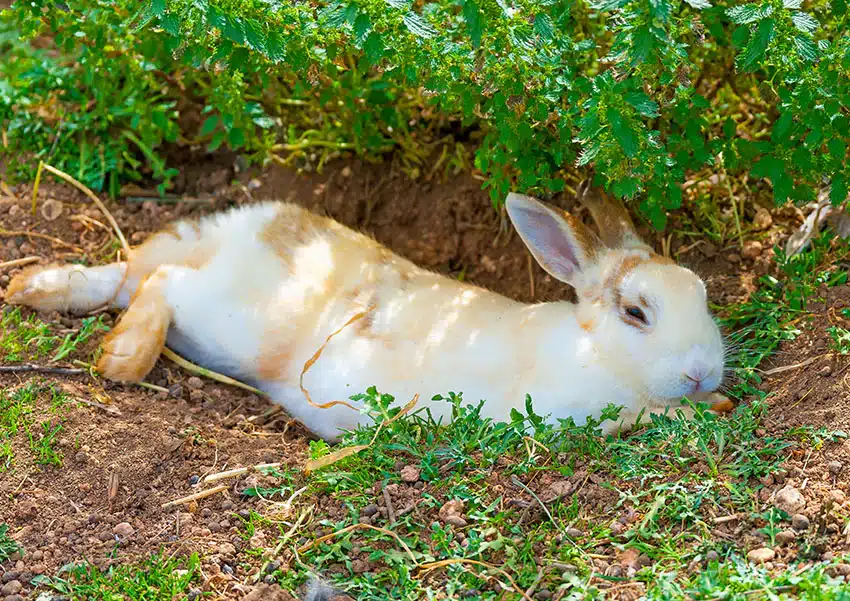
How long do rabbits sleep at night?
Studies have found that rabbits will get around eight and a half hours of sleep in a day on average. However, a rabbit that feels very safe and comfortable in their home environment will often get even more sleep (closer to 12 hours a day). Our rabbits don’t get 8-12 hours of sleep all at once.
Nocturnal or Crepuscular?
Before we explore the duration of rabbit sleep at night, it’s essential to understand their natural tendencies. Unlike humans, who are predominantly diurnal (active during the day), rabbits exhibit crepuscular behavior. This means they are most active during the twilight hours of dawn and dusk. This behavior is thought to have evolved as a survival strategy to avoid predators while still taking advantage of available resources.
Sleep Duration
Rabbits, being crepuscular creatures, have a unique sleep-wake pattern that differs from both nocturnal and diurnal animals. On average, rabbits sleep between 8 to 9 hours a day. However, this sleep is not consolidated into one continuous period. Instead, rabbits take multiple short naps throughout the day and night.
Napping Behavior
Rabbits are light sleepers, always attuned to their surroundings due to their prey animal instincts. Their sleep pattern consists of many short naps that last for about 5 to 10 minutes each. These naps are strategically taken during periods of reduced activity, such as during the day when the sun is at its brightest, and at night when their predators are most active.
Nighttime Sleep
When it comes to nighttime sleep specifically, rabbits are known to take several short naps during the dark hours. These naps can vary in length but typically last around 5 to 10 minutes. This fragmented sleep pattern allows rabbits to rest while still being vigilant against potential threats. However, some domesticated rabbits may adapt their sleep schedule slightly to align with their human companions’ routines, but their crepuscular nature remains at the core.
Creating a Comfortable Sleep Environment
For pet rabbit owners, ensuring that their furry friends have a safe and comfortable sleep environment is essential. Rabbits are sensitive to noise, light, and temperature changes, so providing a quiet and dimly lit area can help facilitate their sleep. Placing their enclosure in a calm part of the house away from loud noises and disturbances can go a long way in promoting healthy sleep.
Signs of Disturbed Sleep
As rabbit owners, it’s important to be aware of signs that may indicate your rabbit’s sleep is being disrupted. Excessive stress, discomfort, illness, or changes in their environment can lead to sleep disturbances. Signs of disturbed sleep in rabbits may include excessive grooming, thumping hind feet, restlessness, and changes in appetite.
Do rabbits sleep quickly?
Whilst humans (if we are lucky) will sleep through the night, rabbits wake up periodically at night, and sleep for quite lengthy periods during the day. They are prey animals, and need to be constantly alert for danger, so in general they sleep much lighter and for shorter periods than we do.
Rapid-Fire Naps
Rabbits are known for their peculiar sleep habits, which include taking rapid-fire naps that last for just a few minutes at a time. These naps, commonly referred to as “catnaps,” are not only a curious sight but also a critical survival strategy in the wild. A rabbit’s sleep duration varies, and they can sleep anywhere from 8 to 9 hours a day. However, this sleep is divided into many short naps that last for about 5 to 10 minutes each.
The Crepuscular Sleepers
Understanding rabbit sleep requires acknowledging their crepuscular nature. Unlike humans, who are diurnal (active during the day), rabbits are most active during the twilight hours of dawn and dusk. This behavior has evolved as a way to stay safe from predators while still being able to forage for food. Their quick naps allow them to rest without leaving themselves vulnerable for too long.
Vigilance in Sleep
One of the reasons for rabbits’ short sleep intervals is their constant need for vigilance. In the wild, rabbits are prey animals, and their survival depends on their ability to detect predators quickly. Their rapid napping schedule ensures that they can rest while still being alert to potential dangers. Even in captivity, this instinctual behavior persists, making them light sleepers that are easily roused by any unusual sounds or movements.
Domestic Adaptations
Domesticated rabbits, those kept as pets, often adapt their sleep patterns slightly to match their human companions’ routines. They might be more active during the day if that’s when their owners are around to interact with them. However, their innate crepuscular behavior remains a core aspect of their sleep pattern. Even if they seem to stay awake for longer periods during the day, they will still take those characteristic short naps.
The Sleep Environment
For rabbit owners, providing a conducive sleep environment is crucial. Rabbits are sensitive to noise, light, and temperature changes. To facilitate their quick naps, it’s essential to create a calm, dimly lit space that mimics their natural habitat conditions. Ensuring their enclosure is situated in a quiet area away from disturbances can help them get the rest they need.
Signs of Disruption
Rabbit enthusiasts should be attuned to signs of disrupted sleep. If a rabbit’s sleep pattern suddenly changes, it might indicate stress, discomfort, illness, or an uncomfortable living environment. Keeping an eye out for unusual behaviors like excessive grooming, thumping hind feet, or a lack of appetite can provide insights into their well-being.
What do rabbits do at night?
Sleeping through the night
Most rabbits will go to sleep between 10-12 pm. They’ll sleep until it’s time to wake up in the morning and start a new day. Like afternoon nap time, many rabbits will periodically get up to stretch and eat in the middle of the night.
Crepuscular Lifestyle
Before delving into the specifics of rabbit behavior at night, it’s important to understand their natural tendencies. Rabbits are not strictly nocturnal; rather, they are crepuscular creatures. This means they are most active during the twilight hours of dawn and dusk, allowing them to avoid predators while still capitalizing on available resources.
Foraging Adventures
At night, rabbits engage in a variety of activities, with foraging being a primary focus. Their quest for sustenance leads them to explore their surroundings in search of plants, grasses, and other edible vegetation. This behavior aligns with their crepuscular nature, as they can take advantage of the cooler temperatures and reduced predator activity to gather their meals.
Social Interactions
Rabbits are social animals that often live in groups, known as colonies or warrens. These groups provide a sense of safety and companionship, particularly during the vulnerable nighttime hours. At night, rabbits within a colony might engage in social interactions, whether it’s grooming each other, playing, or simply huddling together for warmth and security.
Exploration and Territorial Behavior
The cover of darkness gives rabbits an opportunity to explore their territories more freely. They might mark their territory with scent markings, a behavior often facilitated by scent glands located on their chin, paws, and other parts of their body. This territorial behavior helps establish boundaries and communicate with other rabbits in the area.
Reproductive Activities
Rabbit reproduction can also come into play during the night. Breeding among rabbits can occur year-round, and the nighttime provides a relatively safe time for mating due to the reduced presence of predators. Female rabbits, known as does, might be more receptive to mating during their active hours, which can include the nighttime.
Vigilance and Survival
Despite being crepuscular, rabbits are not completely inactive during the night. Their survival instincts remain sharp, and they are known to take short naps throughout the dark hours. These naps are essential for rest, but they’re also characterized by heightened vigilance. Rabbits are ever-watchful for the slightest signs of danger, and their quick reaction time is crucial for evading potential predators.
Adaptations in Captivity
For those who keep rabbits as pets, it’s important to acknowledge their natural rhythms and behaviors. Even domesticated rabbits might exhibit crepuscular tendencies, being more active during the early morning and late evening. Providing them with a safe and stimulating environment during these hours is essential for their well-being.
Do rabbits sleep in dark or light?
Rabbits need a contrast of light and darkness. A rabbit that lives in constant light can experience stress. In addition, their eyes can be damaged, and they’ll gain weight. Provide a dark area for your bunny to sleep and relax within.
Crepuscular Behavior
Before delving into their sleep preferences, it’s crucial to understand rabbits’ crepuscular behavior. Unlike humans, who are diurnal (active during the day), rabbits are most active during the twilight hours of dawn and dusk. This behavior is a survival strategy that allows them to forage for food while minimizing their exposure to predators.
Darkness as a Shield
Rabbits are naturally more comfortable in low-light conditions, as darkness provides them with a sense of security. In the wild, they are prey animals, and darkness helps them hide from potential predators. Darkness also allows rabbits to go about their nocturnal activities—like foraging and socializing—with reduced fear of being spotted by predators.
The Role of Light
While rabbits may be more active during dawn and dusk, it doesn’t necessarily mean they avoid light altogether. In fact, rabbits are known to be sensitive to changes in light levels, especially sudden shifts from darkness to bright light. Exposure to intense, sudden light can startle and stress them, making them retreat to safer areas.
Sleeping Quarters
When it comes to sleep, rabbits tend to seek out sheltered, dimly lit areas. In the wild, this might mean finding spots where moonlight or starlight provides a faint glow. In captivity, pet rabbits often choose areas in their enclosures that are shielded from direct light. These cozy, shaded spaces offer them a sense of security while they rest.
The Domestic Environment
For pet rabbit owners, it’s important to consider their rabbits’ sleep preferences when setting up their living environment. While rabbits might be more active during the twilight hours, they still require restful sleep. Providing a calm, quiet, and dimly lit sleeping space can help them feel safe and comfortable. Some pet owners use ambient lighting or even nightlights to mimic natural low-light conditions.
Disruption of Sleep
Abrupt changes in lighting can disrupt a rabbit’s sleep pattern and overall well-being. Excessive exposure to bright lights during their active periods can lead to stress and restlessness. On the other hand, sudden darkness during their active hours can also cause them to become disoriented or alarmed.
Do rabbits watch you sleep?
Your rabbit is keeping watch for you
They’ll loaf, or lay down near you, but stay more or less aware while you sleep. They’ll often be facing you as they watch over you, but usually, they’re actually keeping an eye and an ear out for potential threats.
The Rabbit-Human Connection
Rabbits are known for their social and curious nature. When kept as pets, they often form strong bonds with their human caregivers. This connection can lead to behaviors that may appear as watching or observing, but it’s essential to understand the context behind these actions.
Crepuscular Activity
Before we delve into whether rabbits watch humans sleep, it’s important to recognize their natural sleep-wake patterns. Rabbits are crepuscular creatures, meaning they are most active during the twilight hours of dawn and dusk. During these times, they might engage in various behaviors, including grooming, exploring, and interacting with their surroundings.
Curiosity and Awareness
Rabbits have keen senses and are naturally curious animals. They may become intrigued by movements, sounds, or changes in their environment, which could include a person shifting in their sleep or other nighttime activities. This curiosity might lead them to observe their surroundings, including the sleeping human.
Bonding and Comfort
If a rabbit has developed a strong bond with a human, it’s possible that they might seek comfort and companionship during the night. Rabbits are social animals, and being close to their bonded human might make them feel secure. As a result, they might choose to be near or even interact with the sleeping person.
Dim Light Sensitivity
Rabbits have sensitive eyes and are adapted to low-light conditions. If there is a source of dim light in the room, such as a nightlight, it might attract the rabbit’s attention and encourage them to explore or observe their surroundings. This behavior might be interpreted as watching, even though their intention is more exploratory than watchful.
Signs of Interaction
If a rabbit is indeed watching or observing a sleeping person, there might be subtle signs of interaction. They might be sitting or lying nearby, possibly grooming themselves or just being still and observant. However, it’s important not to anthropomorphize their actions too much; rabbits don’t have the same motivations or thought processes as humans.
Creating a Comfortable Environment
For rabbit owners, creating a comfortable sleep environment for both themselves and their pets is important. Rabbits should have their own safe and cozy sleeping area where they can rest undisturbed during the night. This might help minimize the chances of them becoming overly curious about human sleep habits.
Do rabbits need sunlight?
Recent research suggests that sunlight, or UV rays, is important for a rabbit’s health. Like in many other animals, sunlight helps the rabbit produce enough vitamin D. Rabbits that don’t get direct sunlight have a greater risk of developing weak bones or dental problems.
Indoor vs. Outdoor Rabbits
For rabbits kept as pets, the question of sunlight becomes particularly relevant. While wild rabbits naturally experience sunlight in their habitats, pet rabbits often live indoors, which can limit their exposure to natural light. Indoor rabbits might not receive the same amount of sunlight as their wild counterparts.
However, it’s important to note that excessive exposure to direct sunlight can also have negative effects, such as overheating, especially for rabbits with thick fur coats. Therefore, finding the right balance is key.
Providing Proper Light
For indoor rabbits, it’s important to replicate natural lighting conditions as closely as possible. This can be achieved by:
Natural Light: If feasible, allow your rabbit to spend supervised time outdoors in a safe and shaded area. Make sure they have access to fresh air and a suitable hiding spot.
Indirect Light: Place their enclosure near windows with indirect sunlight. This allows them to benefit from natural light without being exposed to direct sunlight and its potential risks.
Artificial Lighting: If natural light is limited, you can use artificial lighting to provide a similar effect. Full-spectrum lighting, which mimics natural sunlight, can be beneficial for indoor rabbits. Consult with a veterinarian to determine the best lighting setup.
Dietary Vitamin D
In addition to sunlight, diet plays a crucial role in providing rabbits with the necessary nutrients, including vitamin D. High-quality rabbit pellets, fresh hay, and a variety of fresh vegetables can contribute to a balanced diet that supports overall health.
What do pet rabbits love?
Rabbits love nothing more than having the space to run around, play, dig and explore while enjoying a bit of ‘me’ time. Show your bunnies you love them by offering a secure environment where they can display these natural behaviours safely away from predators. A happy rabbit is a loved rabbit!
Social Interaction
Rabbits are social animals by nature, and they thrive on companionship. One of the things that pet rabbits truly love is spending time with their human caregivers. Interacting with your rabbit through gentle petting, snuggling, and bonding sessions helps strengthen the human-animal bond. Rabbits often enjoy being talked to in soothing tones, making them feel included in your daily life.
Exploring and Play
Rabbits are curious creatures that love to explore their surroundings. Providing them with a safe and stimulating environment for exploration can bring them immense joy. Play is an important aspect of a rabbit’s life, and they love toys that allow them to express their natural behaviors, such as digging, tossing, and chewing. Items like cardboard boxes, tunnels, and chew toys can keep them entertained and mentally engaged.
Tasty Treats
Like many animals, rabbits have a soft spot for treats. Offering them a variety of fresh, rabbit-safe vegetables and fruits as treats can be a special way to show them love. Some popular options include leafy greens like kale and parsley, and small amounts of fruits like apple or banana. Just be mindful of portion sizes and choose treats that are appropriate for their dietary needs.
Safe Hideaways
Rabbits have a natural instinct to seek out safe and cozy hiding spots. Providing them with hideaways, such as cardboard tunnels or enclosed spaces within their enclosure, can give them a sense of security and comfort. These hideaways also mimic their natural behavior of seeking shelter from predators in the wild.
Grooming and Pampering
Grooming is an essential part of a rabbit’s routine, and they often enjoy being groomed by their caregivers. Gentle brushing not only helps keep their fur clean and healthy but also provides a bonding experience. Additionally, some rabbits enjoy being stroked along their back and ears, as it can be quite relaxing for them.
Chewable Delights
Rabbits have a natural need to chew, as it helps keep their teeth in good condition and provides mental stimulation. Offering safe, rabbit-friendly items to chew on, such as untreated wood or woven grass toys, can keep them occupied and prevent boredom.
Quiet and Comfortable Environment
Pet rabbits also appreciate a calm and quiet living environment. Rabbits have sensitive ears and can become stressed by loud noises. Providing them with a peaceful space to retreat to when they need a break from the activity around them is important for their well-being.
Individual Preferences
It’s important to remember that each rabbit is unique and may have individual preferences. Observing your rabbit’s behavior and response to different stimuli can help you tailor their environment and interactions to suit their likes and dislikes.
What are rabbits scared of?
Typical things that can make your rabbit stressed include: novelty (for example the first trip in a car or being handled by a stranger) fear-inducing stimuli (for example sudden noises) social stress (for example too many individuals in a small space, loss of a companion, living alone)
Predators and Loud Noises
Rabbits are natural prey animals, and their instincts are finely tuned to detect potential predators. Sudden movements, large looming figures, or the presence of other animals, such as dogs or cats, can trigger fear responses. Additionally, loud and sudden noises, like thunderstorms or fireworks, can startle and stress rabbits due to their acute hearing.
apid Movements
Rabbits are particularly wary of quick and sudden movements. This instinctual response is a survival mechanism that helps them evade potential threats. If a person or object approaches too rapidly, rabbits might become frightened and try to flee or find a hiding place.
Changes in Environment
Rabbits are creatures of habit, and they can become anxious in the face of sudden changes in their environment. Rearranging their enclosure or introducing new objects might make them feel uneasy until they have had time to investigate and adjust to the changes.
Handling and Predatory Grabs
While some rabbits enjoy gentle handling and petting, others might find it intimidating or frightening. This can be particularly true for rabbits that have not been socialized with humans from a young age. Predatory grabs or attempts to pick them up suddenly can trigger fear responses and lead to struggle or aggressive behavior.
Isolation and Loneliness
Rabbits are social animals that thrive on companionship. Being left alone for extended periods of time can lead to loneliness and anxiety. They may become stressed or fearful if they don’t have the presence of a fellow rabbit or a human companion to keep them company.
Lack of Hiding Places
In the wild, rabbits rely on natural hiding spots to evade predators. Similarly, pet rabbits appreciate having places where they can retreat and feel safe. A lack of suitable hiding places can cause stress and discomfort for rabbits, as they may feel exposed and vulnerable.
Bright Lights
Rabbits have sensitive eyes adapted to low-light conditions. Bright lights can be overwhelming and distressing for them, potentially leading to fear or discomfort. Providing dimly lit areas where they can rest and hide is essential for their well-being.
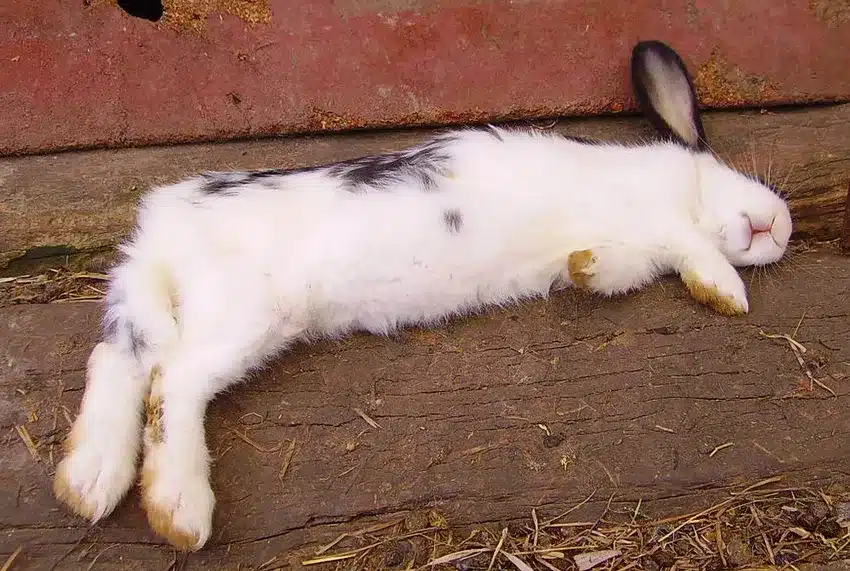
Conclusion
In the realm of natural wonders, the sleeping habits of rabbits add yet another layer of fascination to their already captivating existence. The exploration into the question “How long do rabbits sleep?” has revealed a dynamic dance between tranquility and alertness that is finely tuned to the demands of their environment. Beyond their boundless energy and playful demeanor lies a carefully balanced strategy for survival.
Rabbits, it turns out, are not ceaseless bundles of energy but creatures that heed the call of slumber to replenish their vitality. The factors influencing their sleep duration, from safety concerns to the crepuscular rhythm of their lives, highlight the intricate tapestry of adaptation that has unfolded over eons. Their ability to switch between vigilant wakefulness and peaceful rest underscores the wisdom of evolution, enabling them to thrive even in habitats teeming with potential threats.
Comparing their sleep patterns to those of other animals offers a valuable perspective on the diversity of strategies employed across species to cope with the challenges of existence. In the mosaic of life, rabbit sleep emerges as a vital piece, contributing to their overall well-being and success.

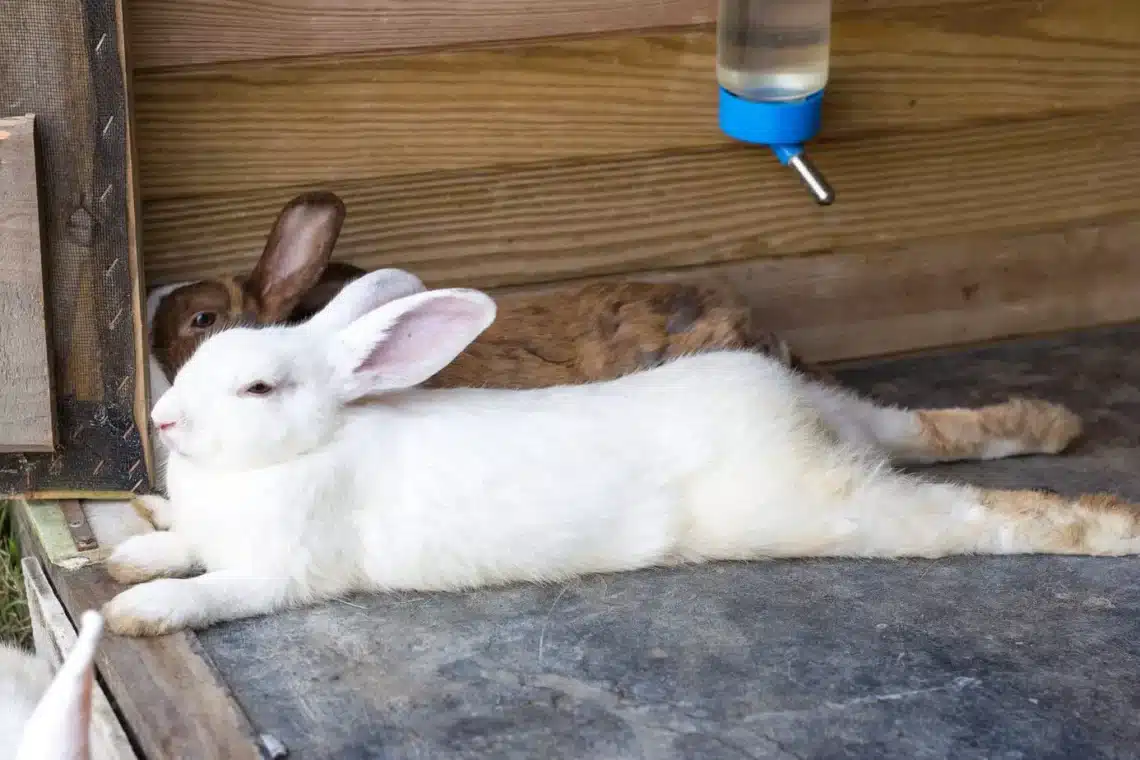
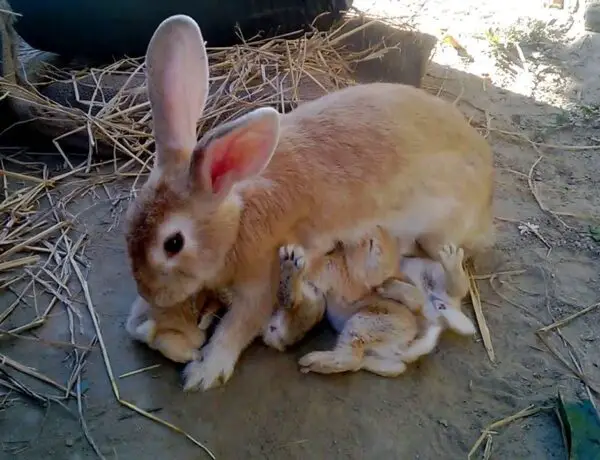
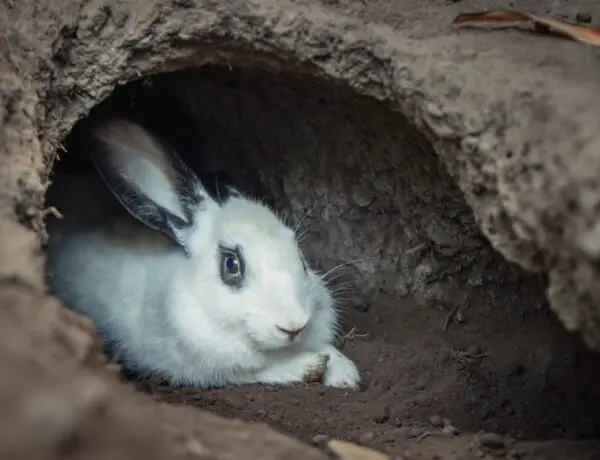
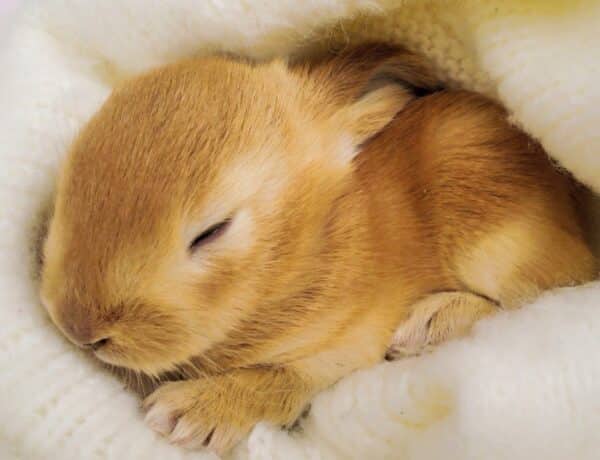
No Comments